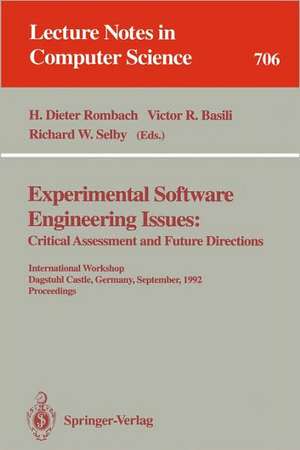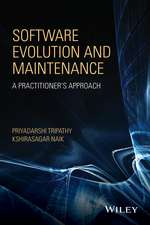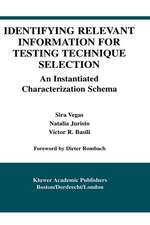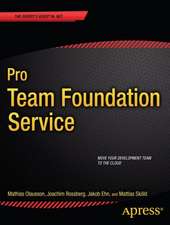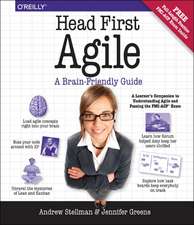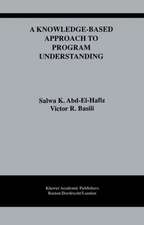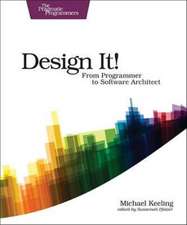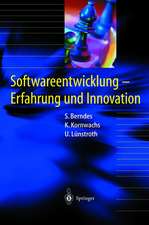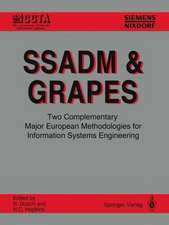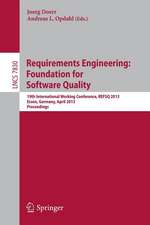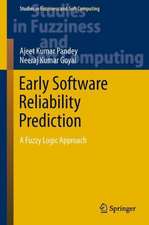Experimental Software Engineering Issues:: Critical Assessment and Future Directions. International Workshop, Dagstuhl Castle, Germany, September 14-18, 1992. Proceedings: Lecture Notes in Computer Science, cartea 706
Editat de H.Dieter Rombach, Victor R. Basili, Richard W. Selbyen Limba Engleză Paperback – 30 aug 1993
Din seria Lecture Notes in Computer Science
- 20%
 Preț: 1061.55 lei
Preț: 1061.55 lei - 20%
 Preț: 307.71 lei
Preț: 307.71 lei - 20%
 Preț: 438.69 lei
Preț: 438.69 lei - 20%
 Preț: 579.30 lei
Preț: 579.30 lei -
 Preț: 410.88 lei
Preț: 410.88 lei - 17%
 Preț: 427.22 lei
Preț: 427.22 lei - 20%
 Preț: 596.46 lei
Preț: 596.46 lei - 15%
 Preț: 448.04 lei
Preț: 448.04 lei - 20%
 Preț: 353.50 lei
Preț: 353.50 lei -
 Preț: 389.49 lei
Preț: 389.49 lei - 20%
 Preț: 309.90 lei
Preț: 309.90 lei - 20%
 Preț: 645.28 lei
Preț: 645.28 lei - 20%
 Preț: 763.23 lei
Preț: 763.23 lei - 15%
 Preț: 580.46 lei
Preț: 580.46 lei - 20%
 Preț: 310.28 lei
Preț: 310.28 lei - 20%
 Preț: 655.02 lei
Preț: 655.02 lei - 20%
 Preț: 1183.14 lei
Preț: 1183.14 lei - 20%
 Preț: 340.32 lei
Preț: 340.32 lei -
 Preț: 449.57 lei
Preț: 449.57 lei - 20%
 Preț: 591.51 lei
Preț: 591.51 lei - 18%
 Preț: 938.83 lei
Preț: 938.83 lei - 20%
 Preț: 337.00 lei
Preț: 337.00 lei - 20%
 Preț: 649.50 lei
Preț: 649.50 lei - 20%
 Preț: 607.40 lei
Preț: 607.40 lei - 20%
 Preț: 1414.79 lei
Preț: 1414.79 lei - 20%
 Preț: 1024.44 lei
Preț: 1024.44 lei - 20%
 Preț: 583.40 lei
Preț: 583.40 lei - 20%
 Preț: 453.32 lei
Preț: 453.32 lei - 20%
 Preț: 575.49 lei
Preț: 575.49 lei - 20%
 Preț: 1075.26 lei
Preț: 1075.26 lei - 20%
 Preț: 585.88 lei
Preț: 585.88 lei - 20%
 Preț: 825.93 lei
Preț: 825.93 lei - 17%
 Preț: 360.20 lei
Preț: 360.20 lei - 20%
 Preț: 763.23 lei
Preț: 763.23 lei - 20%
 Preț: 340.32 lei
Preț: 340.32 lei - 20%
 Preț: 504.58 lei
Preț: 504.58 lei - 20%
 Preț: 369.13 lei
Preț: 369.13 lei - 20%
 Preț: 580.93 lei
Preț: 580.93 lei - 20%
 Preț: 343.62 lei
Preț: 343.62 lei - 20%
 Preț: 350.21 lei
Preț: 350.21 lei - 20%
 Preț: 583.40 lei
Preț: 583.40 lei - 20%
 Preț: 583.40 lei
Preț: 583.40 lei - 15%
 Preț: 438.59 lei
Preț: 438.59 lei - 20%
 Preț: 341.95 lei
Preț: 341.95 lei - 20%
 Preț: 238.01 lei
Preț: 238.01 lei - 20%
 Preț: 538.30 lei
Preț: 538.30 lei
Preț: 332.39 lei
Preț vechi: 415.49 lei
-20% Nou
Puncte Express: 499
Preț estimativ în valută:
63.62€ • 69.13$ • 53.48£
63.62€ • 69.13$ • 53.48£
Carte tipărită la comandă
Livrare economică 21 aprilie-05 mai
Preluare comenzi: 021 569.72.76
Specificații
ISBN-13: 9783540570929
ISBN-10: 3540570926
Pagini: 292
Ilustrații: XIX, 265 p.
Dimensiuni: 155 x 233 x 15 mm
Greutate: 0.42 kg
Ediția:1993
Editura: Springer Berlin, Heidelberg
Colecția Springer
Seria Lecture Notes in Computer Science
Locul publicării:Berlin, Heidelberg, Germany
ISBN-10: 3540570926
Pagini: 292
Ilustrații: XIX, 265 p.
Dimensiuni: 155 x 233 x 15 mm
Greutate: 0.42 kg
Ediția:1993
Editura: Springer Berlin, Heidelberg
Colecția Springer
Seria Lecture Notes in Computer Science
Locul publicării:Berlin, Heidelberg, Germany
Public țintă
ResearchCuprins
The experimental paradigm in software engineering.- Profile of an artifact assessment capability.- Experiments and measurements for systems integration.- Software engineering still on the way to an engineering discipline.- Problems in modeling the software development process as an adventure game.- Qualitative techniques and tools for measuring, analyzing, and simulating software processes.- On experimental Computer Science.- Session 1 summary the experimental paradigm in software engineering.- Objectives and context of software measurement, analysis and control.- Position paper.- Software Engineering as an organisational challenge.- Quantitative measurements based on process and context models.- Selecting, implementing, and measuring methods to improve the software development process.- Rethinking measurement to support incremental process improvement.- Session 2 summary objectives and context of measurement/experimentation.- Software measurement and experimentation frameworks, mechanisms, and infrastructure.- Towards well-defined, shareable product data.- A view on the use of three research philosophies to address empirically determined weaknesses of the software engineering process.- Bridging the gap between research and practice in software engineering management: Reflections on the staffing factors paradox.- A methodology for evaluating software engineering methods and tools.- Experimental software engineering should concentrate on software evolution.- Yet another laboratory for software engineering.- An axiomatic model for program complexity.- Support of experimentation by measurement theory.- Session 3 summary procedures and mechanisms for measurement/experimentation.- Task-specific utility assessment models and their role in the development of software engineering handbooks.- Quantitative empirical modeling for managing software development: Constraints, needs and solutions.- Software business, concurrent engineering and experience factory relationships.- Establishing the fundamentals of software engineering.- Measurement-based modelling issues — the problem of assuring ultra-high dependability.- The role of simulation in software engineering experimentation.- Multiple viewpoints of software models.- Session 4 summary [Measurement-based] modeling.- Software engineering models, using and reusing.- Model reuse and technology transfer.- Packaging for reuse and reuse of models.- A reuse culture for software construction.- Experimental software engineering; Packaging for reuse.- Experimental designs for validating metrics and applying them across multiple projects.- Session 5 summary packaging for reuse.- Position paper.- Technology transfer.- Systematic software technology transfer.- Effective use of measurement and experimentation in computing curricula.- Session 6 summary technology transfer, teaching and training.
